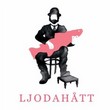|
|

Ljodahått Sometimes it makes good sense to be sceptical about actors involved in pure musical projects. Also, utilisation of serious poems as song lyrics may not always be a good idea. But of course there are exceptions. Here's one of them. Ljodahått is the brain child of Magne Håvard Brekke, a Norwegian actor that has worked in Berlin and Paris for almost three decades. Ljodahått is an attempt to draw on his Norwegian heritage as seen from abroad. He has picked several poems by classical Norwegian poets, mostly from the 19th and 20th century, some of them even renowned abroad like Henrik Ibsen and Nobel Prize winner Knut Hamsun. Others are probably unknown outside Scandinavia, but indeed well known and dear to Norwegians, the minority that cares about poetry that is. Initially Magne approached Ståle Caspersen, aka Reg Trademark of The Tables fame, to write music to the poems. They planned a theater performance with dialogues based on a critically acclaimed writer friend's novels interspersed with poems put to music. They received a grant from the Norwegian Culture Council in 2006 and got going. Along the way, the project changed course, musicians from different parts of Western Europe were involved and the theatre dialogues were dropped. Eventually they had created a performance more in the cabaret vein where the poems and music had taken centre stage. They also went into a studio in Norway in the summer of 2009 and here, finally, is the end result, an album of 13 songs/poems. Six of them composed by Ståle and six by the two Frenchmen of the band Laurent Petitgand and Sebastian Souchois. Magne sings and occasionally recites the lyrics on the majority of songs but a few are sung by some of the foreign musicians that hardly had spoken a word in Norwegian beforehand. On "To Fjernsyn" (Two Television Sets) acknowledged Norwegian actor Hildegun Riise steps in as guest vocalist. The music is not as influenced by neither Norwegian folk nor pop music as could be expected. Only a couple of them include folk flavours, most notably "Tord Foleson" with accordion, Harding fiddle (a Norwegian speciality), hurdy-gurdy and pump organ. Instead the music might be characterized as a mixture of French cabaret and Tom Waits with detours towards singer-songwriter stuff, pop, ballad, chamber, contemporary serious music and back again. Apart from some electric guitar, bass and organ all instruments are acoustic, including cello, concertina, and wine glasses. I witnessed the ten men strong Ljodahått orchestra a few weeks back. They ooze of charm while trying to sort out what instruments to play on the next song, what song to play, small remarks, German and French speaking musicians singing in broken Norwegian etc., etc. After the band had left the stage for the first time, Swiss Jürg Kienberger sneaked in again and performed his own composition "Svevn" (Sleep), also on the disc, all by himself on his merry organ with rhythm box and all ('It's too complicated for the rest of the band!', he whispered) while the others peeped out at him from the backstage door halfway through the song. So, while the live version of Ljodahått mainly deals with the music and moods of the poems and the band members, the album concentrates more on the poems themselves. The album is in fact a small book were the 13 poems are printed in Norwegian and translated into English, German and French accompanied by a CD. I particularly enjoy "Det Trengst So Lita Minning" (It Needs Just A Little Memory) with a string trio from a tango café in Paris or Buenos Aires and a slight hangover feeling. "Godnat Herinde" (Goodnight In Here) is the ultimate potential hit of the album and live performance, the music is even more romantic-mystic-languishing than Knut Hamsun's lyrics. "Du Ska Itte Trø I Graset" (You Shouldn't Tread On The Grass) was a real eye-opener. It has been put music to this poem earlier and every kid in Norway have probably sung it or at least pretended to do so for the last 60 years. I thought of it as something quite old-fashioned, naïve and hopeless. In fact it's an opportune reminder to take care of nature, accompanied by a new and sweet little melody: You shouldn't tread on the
grass Ljodahått is a one of a kind project and album. The album is great, but if you have the chance, it's even grander to experience the ten men with the bowler hats live. They might show up in Vienna in the autumn and maybe Paris next year. You can find more information on the Ljodahått home page. There you can read that the name is taken from a kind of verse used in ancient Nordic poetry (The Younger Edda) of the Viking era. It originally translated as 'troll song' or 'magic song' but also means contradictive voices/tunes put up against each other. Copyright © 2012 JP
|
| © 2012 Luna Kafé |